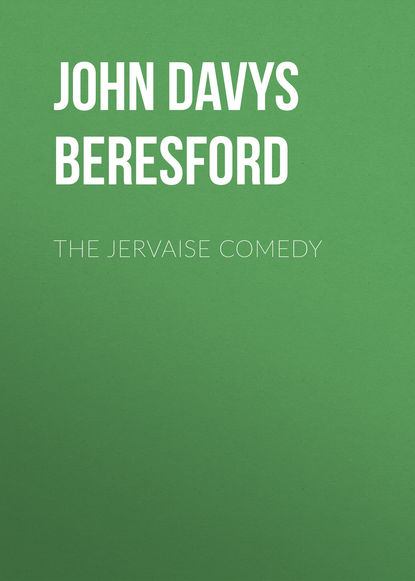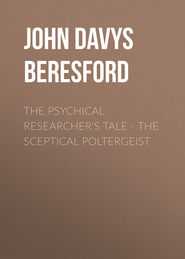По всем вопросам обращайтесь на: info@litportal.ru
(©) 2003-2024.
✖
The Jervaise Comedy
Автор
Год написания книги
2018
Настройки чтения
Размер шрифта
Высота строк
Поля
I felt a thrill of hope. “But neither are you,” I said.
“Oh!” she commented softly.
“I’ve had romantic visions, too,” I went on; “of what she would look like when I did meet her. But when I saw you, I remembered, and all the visions—oh! scattered; vanished into thin air.”
“If you hadn’t been so successful…” she murmured.
“I’m sorry for that,” I agreed. “But I’m going to make amends. I realised it all this afternoon in the wood when I went to meet Arthur. I’m going to begin all over again, now. I’m coming to Canada—to work.” The whole solution of my problem was suddenly clear, although I had not guessed it until that moment. “I’m going to buy a farm for all of us,” I went on quickly, “and all the money that’s over, I shall give away. The hospitals are always willing to accept money without asking why you give it. They’re not suspicious, they don’t consider themselves under any obligation.”
“How much should you have to give away?” she asked.
“Thirty or forty thousand pounds,” I said. “It depends on how much the farm costs.”
“Hadn’t you better keep a little, in case the farm fails?” she put in.
“It won’t fail,” I said. “How could it?”
“And you’d do all that just because you’ve—remembered me?”
“There was another influence,” I admitted.
“What was that?” she asked, with the sound of new interest in her voice.
“All this affair with the Jervaises,” I said. “It has made me hate the possession of money and the power money gives. That farm of ours is going to be a communal farm. Our workers shall have an interest in the profits. No one is to be the proprietor. We’ll all be one family—no scraping for favours, or fears of dismissal; we’ll all be equal and free.”
She did not answer that, at once; and I had an unpleasant feeling that she was testing my quality by some criterion of her own, weighing the genuineness of my emotion.
“Did you feel like this about things this afternoon?” she asked, after what seemed to me an immense interval.
I was determined to tell her nothing less than the truth. “No,” I confessed, “much of it was a result of what you said to me. I—I had an illumination. You made me see what a poor thing my life had been; how conventional, artificial, worthless, it was. What you said about my plays was so true. I had never realised it before—I hadn’t bothered to think about it.”
“I don’t remember saying anything about your plays,” she interrupted me.
“Oh! you did,” I assured her; “very little; nothing directly; but I knew what you felt, and when I came to think it over, I agreed with you.”
“I’ve only seen one,” she remarked.
“They’re all the same,” I assured her, becoming fervent in my humility.
“But why go to Canada?” she asked. “Why not try to write better plays?”
“Because I saw my whole life plainly, in the wood this afternoon,” was my reply. “I did not know what to do then. I couldn’t see any answer to my problem. But when you were speaking to me a minute ago, I realised the whole thing clearly. I understood what I wanted to do.
“It’s a form of conversion,” I concluded resolutely.
“I’m sure you mean it all—now,” she commented, as if she were speaking to herself.
“It isn’t a question of meaning anything,” I replied. “The experiences of this week-end have put the whole social question in a new light for me. I could never go back, now, to the old life. My conscience would always be reproaching me, if I did.”
“But if you’re rich, and feel like that, oughn’t you to shoulder your responsibilities?” she asked.
“Do something? Wouldn’t it be rather like running away to give your money to the hospitals and go to Canada to work on a farm?”
“That’s my present impulse,” I said. “And I mean to follow it. I don’t know that I shall want to stay in Canada for the rest of my life. I may see further developments after I’ve been there for a few years. But…”
“Go on,” she urged me.
“But I want to—to stay near you—all of you. I can’t tell you how I admire your father and mother and Arthur and—all of you. And you see, I admit that this conversion of mine has been very sudden. I—I want to learn.”
“Do you always follow your impulses like this?” she put in.
“I’ve never had one worth following before,” I said.
“What about wanting to fight Frank Jervaise?” she asked. “And running away from the Hall? And suddenly taking Arthur’s side in the row? and all those things? Didn’t you follow your impulses, then?”
And yet, it had never before occurred to me that I was impulsive. I had imagined myself to be self-controlled, rather business-like, practical. I was frankly astonished at this new light on my character.
“I suppose I did, in a way,” I admitted doubtfully.
“To say nothing of…” she began, and stopped with a little, rather embarrassed laugh.
“Of what?” I urged her.
“How many times before have you imagined yourself to be head over ears in love?” she asked.
I was repaid in that moment for all the self-denials and fastidious shrinkings of my youth.
“Never once!” I acclaimed triumphantly. “It’s the one common experience that has passed me by. I’ve often wondered why I could never fall in love. I’ve admired any number of women. I’ve tried to fall in love with them. And I have never been able to, try as I would. I could deceive myself about other things, but never about that. Now, I know why.”
I waited for her encouragement, but as she did not speak I went on with more hesitation. “You’ll think me a romantic fool, I suppose, if I tell you why?”
“Oh! I know, I know,” she said. “You’ve told me already in so many words. You mean that you’ve been waiting for me; that you had to wait for me. You’ve been very frank. You deserve some return. Shall I tell you just how I feel? I will. I don’t mind telling you the truth, too. I did remember you last night. But not since; not even now. But I like you—I like you very much—as you are this evening. More than I’ve ever liked any man before. And if you went away, I should remember you; and want you to come back. But you must give me time. Lots of time. Don’t make love to me any more; not yet; not till I’ve really remembered. I think I shall—in a little while—when you’ve gone away. You’re so near me, now. And so new. You don’t belong to my life, yet.”
She paused and then went on in another tone. “But I believe you’re right about Canada. I’ll explain it all to the others. We’ll make some kind of arrangement about it. I expect it will have to be your farm, nominally, for a time—until we all know you better. I can feel that you do—that you have taken a tremendous fancy to all of us. I felt it just now, after supper. I was watching you and—oh! well, I knew what you were feeling about my father and mother; and it seemed to be just what I should have liked you to feel. But I don’t think I would give all my money to the hospitals, if I were you. Not without thinking it over a bit, first. Wait until we get to Canada and see—how we get on.”
“You don’t trust my impulses,” I said.
She laughed. “Wait till to-morrow anyway,” she replied.
And as she spoke I heard far away, across the Park, the sound of the stable-clock at the Hall, striking twelve. The artificial sound of it was mellowed and altered by distance; as different from that theatrical first striking I had noticed in the exciting atmosphere of the crowd, as was my present state of mind from that in which I had expectantly waited the coming of romance….
“To-morrow begins now,” I said.
“And I have to be up before six,” she added, in the formal voice she knew so well how to assume.
I felt as though she had by that one return to civility cancelled all that she said, and as we turned back to the house, I began to wonder whether the promise of my probation was as assured as I had, a minute earlier, so confidently believed.
We were nearly at the little porch that would for ever be associated in my mind with the fumbling figure of Frank Jervaise, when she said,
“Oh!” she commented softly.
“I’ve had romantic visions, too,” I went on; “of what she would look like when I did meet her. But when I saw you, I remembered, and all the visions—oh! scattered; vanished into thin air.”
“If you hadn’t been so successful…” she murmured.
“I’m sorry for that,” I agreed. “But I’m going to make amends. I realised it all this afternoon in the wood when I went to meet Arthur. I’m going to begin all over again, now. I’m coming to Canada—to work.” The whole solution of my problem was suddenly clear, although I had not guessed it until that moment. “I’m going to buy a farm for all of us,” I went on quickly, “and all the money that’s over, I shall give away. The hospitals are always willing to accept money without asking why you give it. They’re not suspicious, they don’t consider themselves under any obligation.”
“How much should you have to give away?” she asked.
“Thirty or forty thousand pounds,” I said. “It depends on how much the farm costs.”
“Hadn’t you better keep a little, in case the farm fails?” she put in.
“It won’t fail,” I said. “How could it?”
“And you’d do all that just because you’ve—remembered me?”
“There was another influence,” I admitted.
“What was that?” she asked, with the sound of new interest in her voice.
“All this affair with the Jervaises,” I said. “It has made me hate the possession of money and the power money gives. That farm of ours is going to be a communal farm. Our workers shall have an interest in the profits. No one is to be the proprietor. We’ll all be one family—no scraping for favours, or fears of dismissal; we’ll all be equal and free.”
She did not answer that, at once; and I had an unpleasant feeling that she was testing my quality by some criterion of her own, weighing the genuineness of my emotion.
“Did you feel like this about things this afternoon?” she asked, after what seemed to me an immense interval.
I was determined to tell her nothing less than the truth. “No,” I confessed, “much of it was a result of what you said to me. I—I had an illumination. You made me see what a poor thing my life had been; how conventional, artificial, worthless, it was. What you said about my plays was so true. I had never realised it before—I hadn’t bothered to think about it.”
“I don’t remember saying anything about your plays,” she interrupted me.
“Oh! you did,” I assured her; “very little; nothing directly; but I knew what you felt, and when I came to think it over, I agreed with you.”
“I’ve only seen one,” she remarked.
“They’re all the same,” I assured her, becoming fervent in my humility.
“But why go to Canada?” she asked. “Why not try to write better plays?”
“Because I saw my whole life plainly, in the wood this afternoon,” was my reply. “I did not know what to do then. I couldn’t see any answer to my problem. But when you were speaking to me a minute ago, I realised the whole thing clearly. I understood what I wanted to do.
“It’s a form of conversion,” I concluded resolutely.
“I’m sure you mean it all—now,” she commented, as if she were speaking to herself.
“It isn’t a question of meaning anything,” I replied. “The experiences of this week-end have put the whole social question in a new light for me. I could never go back, now, to the old life. My conscience would always be reproaching me, if I did.”
“But if you’re rich, and feel like that, oughn’t you to shoulder your responsibilities?” she asked.
“Do something? Wouldn’t it be rather like running away to give your money to the hospitals and go to Canada to work on a farm?”
“That’s my present impulse,” I said. “And I mean to follow it. I don’t know that I shall want to stay in Canada for the rest of my life. I may see further developments after I’ve been there for a few years. But…”
“Go on,” she urged me.
“But I want to—to stay near you—all of you. I can’t tell you how I admire your father and mother and Arthur and—all of you. And you see, I admit that this conversion of mine has been very sudden. I—I want to learn.”
“Do you always follow your impulses like this?” she put in.
“I’ve never had one worth following before,” I said.
“What about wanting to fight Frank Jervaise?” she asked. “And running away from the Hall? And suddenly taking Arthur’s side in the row? and all those things? Didn’t you follow your impulses, then?”
And yet, it had never before occurred to me that I was impulsive. I had imagined myself to be self-controlled, rather business-like, practical. I was frankly astonished at this new light on my character.
“I suppose I did, in a way,” I admitted doubtfully.
“To say nothing of…” she began, and stopped with a little, rather embarrassed laugh.
“Of what?” I urged her.
“How many times before have you imagined yourself to be head over ears in love?” she asked.
I was repaid in that moment for all the self-denials and fastidious shrinkings of my youth.
“Never once!” I acclaimed triumphantly. “It’s the one common experience that has passed me by. I’ve often wondered why I could never fall in love. I’ve admired any number of women. I’ve tried to fall in love with them. And I have never been able to, try as I would. I could deceive myself about other things, but never about that. Now, I know why.”
I waited for her encouragement, but as she did not speak I went on with more hesitation. “You’ll think me a romantic fool, I suppose, if I tell you why?”
“Oh! I know, I know,” she said. “You’ve told me already in so many words. You mean that you’ve been waiting for me; that you had to wait for me. You’ve been very frank. You deserve some return. Shall I tell you just how I feel? I will. I don’t mind telling you the truth, too. I did remember you last night. But not since; not even now. But I like you—I like you very much—as you are this evening. More than I’ve ever liked any man before. And if you went away, I should remember you; and want you to come back. But you must give me time. Lots of time. Don’t make love to me any more; not yet; not till I’ve really remembered. I think I shall—in a little while—when you’ve gone away. You’re so near me, now. And so new. You don’t belong to my life, yet.”
She paused and then went on in another tone. “But I believe you’re right about Canada. I’ll explain it all to the others. We’ll make some kind of arrangement about it. I expect it will have to be your farm, nominally, for a time—until we all know you better. I can feel that you do—that you have taken a tremendous fancy to all of us. I felt it just now, after supper. I was watching you and—oh! well, I knew what you were feeling about my father and mother; and it seemed to be just what I should have liked you to feel. But I don’t think I would give all my money to the hospitals, if I were you. Not without thinking it over a bit, first. Wait until we get to Canada and see—how we get on.”
“You don’t trust my impulses,” I said.
She laughed. “Wait till to-morrow anyway,” she replied.
And as she spoke I heard far away, across the Park, the sound of the stable-clock at the Hall, striking twelve. The artificial sound of it was mellowed and altered by distance; as different from that theatrical first striking I had noticed in the exciting atmosphere of the crowd, as was my present state of mind from that in which I had expectantly waited the coming of romance….
“To-morrow begins now,” I said.
“And I have to be up before six,” she added, in the formal voice she knew so well how to assume.
I felt as though she had by that one return to civility cancelled all that she said, and as we turned back to the house, I began to wonder whether the promise of my probation was as assured as I had, a minute earlier, so confidently believed.
We were nearly at the little porch that would for ever be associated in my mind with the fumbling figure of Frank Jervaise, when she said,








